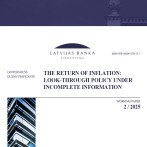In January, oil price dynamic overshadows the impact of opening the electrical energy market
In January 2015, the annual inflation continued to drop and, according to the Central Statistical Bureau (CSB) data, reached -0.4%. The data indicate that the drop in global oil and food prices to a great degree overshadowed the impact of the domestic factor – liberalization of the electrical energy market, whereas the rise in the prices of several services still points to sustained demand.
Even though under the impact of the the liberalization of the electrical energy market the contribution of electrical energy prices to total inflation reached almost 0.9pp, total inflation remained very low because of other factors. The most important among these factors were the low oil prices and the drop in global food prices. The combined impact of the drop in fuel, gas and thermal energy prices on annual inflation reached -1.3pp.
The drop in the prices of oil and the related energy resources in January was reflected in the decrease in the prices of fuel, gas, thermal energy as well as transport services. The impact of the oil product prices on inflation was slightly reduced both by the rise of the value of the US dollar and the contraction of the relative expenditure for energy in the basket of commodities. The contraction in the percentage of expenditure was mainly due to the price drop of previous years.
Prices of thermal energy could drop further this year. In part, this is related to the oil factor (which, however, is relatively unstable from the projections point of view). AS "Latvijas Gāze" in February published projections for natural gas tariffs for the industrial consumers. Even though oil prices have started to rise somewhat, these projections, which depend on the nine-month average quotation for heavy fuel oil, point to a falling trend for thermal energy prices up to March. In some cities, for example, Liepāja, the thermal energy price could decrease due to the changes in the production process.
The other big set of global prices that affects inflation in Latvia is the prices of food and agricultural products. These too continued to drop in January, along with energy prices limiting the rises of both producer and consumer prices not only in Latvia but also in many of its most important trading partners. Thus in many industries of Latvia's trading partners there is no pressure from the costs of raw materials, and that acts to reduce the impact of import prices on the consumer price level in Latvia. Food prices in January dropped in many important groups (cereal products, bread, dairy products, meat, potatoes), which is uncharacteristic of January, i.e., in January rising foodstuffs prices are usually observed.
The updated Consumer price index (CPI) weights bear out the assumption that one of the reasons for a sustained rise in services prices is a sustained demand. This is promoted by stability or drops in some categories of goods prices and, simultaneously, a gradually rising average income. In the CPI weights used in 2015, the share of services has grown slightly. Even though the prices of some services (e.g., medical, transport, tourism) dropped in January, this is primarily related to the costs of fuel or price regulation. In other groups of services, such as catering, accommodation, personal care, the prices rose. Thus there seems to be no ground for ascribing price drops to demand. It may be the feeling of sustained demand that has convinced "Rīgas Satiksme" to move opposite the impact of energy prices by raising the public transportation fares and thereby substantially increasing the impact of the prices of transport services on inflation.
The low annual inflation in January is mostly due to supply side factors, primarily energy prices, which in the global market are subject to great fluctuations. The supply side impact on prices may promote demand, retaining sustained prices of industrial goods and services.
Textual error
«… …»






